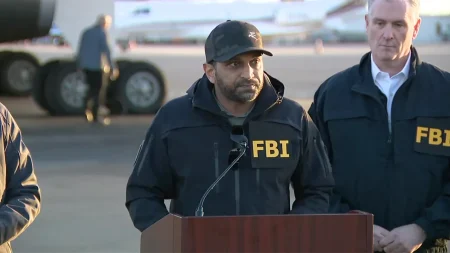Argentina’s Economic Tightrope: Milei’s Reforms, Inflation Battle, and the Trump Lifeline
Milei’s Radical Economic Agenda Faces Stark Reality Check as Argentina Struggles with Historic Crisis
In the heart of South America, Argentina is experiencing one of the most dramatic economic overhauls in its modern history. President Javier Milei, the self-described “anarcho-capitalist” who swept to power last December, promised Argentines a radical solution to their country’s chronic economic woes. Eight months into his presidency, Milei has indeed delivered on promises to slash inflation and government spending, but these achievements have come at a tremendous social cost that threatens to undermine his administration’s stability. As Argentina teeters on the edge of yet another economic precipice, an unexpected development has emerged from the north: former U.S. President Donald Trump has extended what many analysts are calling a potential lifeline to the struggling South American nation.
Milei’s economic program, dubbed by his supporters as “shock therapy” and by critics as “austerity on steroids,” has produced mixed results that tell a complex story about the challenges of economic reform in developing economies. The inflation rate, which reached a staggering 211% annually when Milei took office, has steadily declined to 123% as of July 2023 – still astronomically high by global standards but moving in the right direction. This reduction came primarily through aggressive monetary tightening, slashing government subsidies, and canceling thousands of public works projects. “We are performing economic surgery without anesthesia,” Milei declared in a recent address to the nation, defending his approach as necessary medicine for an economy addicted to government spending and monetary expansion. The peso has stabilized somewhat after years of dramatic devaluation, and the country’s notoriously wide gap between official and black market exchange rates has narrowed, providing some semblance of financial predictability for businesses and investors who had been operating in conditions of extreme uncertainty.
However, the social impact of Milei’s policies has been severe, creating a humanitarian crisis that threatens to boil over into widespread unrest. Poverty rates have skyrocketed to nearly 55% of the population, with extreme poverty affecting almost 20% of Argentines according to the latest figures from the Catholic University of Argentina’s Social Debt Observatory. Real wages have collapsed by approximately 15% since December, and unemployment has climbed to 9.2%, with informal workers bearing the brunt of the economic contraction. The cuts to energy subsidies have resulted in electricity and gas bills increasing by up to 400% for many households, while public transportation costs have more than doubled. “We’re seeing people who previously belonged to the middle class now relying on community soup kitchens,” explained Mariana Fernández, who runs a community assistance center in Buenos Aires’ working-class La Matanza district. “Many families simply cannot afford both food and housing anymore.” Public hospitals report critical shortages of medications and basic supplies, while public school teachers have gone months without wage adjustments despite runaway inflation eroding their purchasing power.
The economic crisis has predictably sparked political backlash, with Milei’s approval ratings dropping from an initial 60% to around 43% in recent polls. Mass protests have become a weekly occurrence in major cities, occasionally turning violent as tensions escalate between demonstrators and security forces. The powerful labor unions, a traditional force in Argentine politics, have organized five general strikes since January, paralyzing transportation and public services. Even members of Milei’s fragile congressional coalition have begun distancing themselves from some of his more controversial measures, complicating his ability to push through additional reforms. Political analyst Carlos Malamud of the Real Instituto Elcano notes, “Milei’s libertarian revolution is encountering the same problem that has derailed previous reform attempts in Argentina – the social pain becomes unbearable before the economic benefits materialize, creating political pressure to abandon the program.” The president, for his part, remains defiant, frequently taking to social media to denounce critics as “defenders of the corrupt system that brought Argentina to ruin” and pledging to continue his economic program regardless of political costs.
Against this backdrop of domestic turmoil, former U.S. President Donald Trump’s recent statements about Argentina have created both opportunity and controversy. Following his Republican nomination acceptance speech, Trump specifically mentioned Argentina as a “great country being destroyed by socialist policies” and promised that his administration would “help President Milei restore Argentina’s prosperity through free market solutions.” Days later, in a phone call reported by both sides, Trump reportedly discussed potential financial assistance and preferential trade terms should he win November’s election. This unexpected diplomatic opening has been seized upon by Milei, who has made no secret of his admiration for Trump, even attending the Conservative Political Action Conference (CPAC) in February where he declared himself “the Trump of Argentina.” Financial markets responded positively to the prospect of American support, with Argentine bonds rallying and the country risk index dropping by nearly 150 basis points. Economy Minister Luis Caputo was quick to capitalize on the moment, suggesting that “international confidence in Argentina’s new direction is growing, which will accelerate our return to global capital markets.”
The potential Trump lifeline, however, comes with significant complications, both practical and geopolitical. For one, any promises made during a campaign may not translate into actual policy, especially given the constraints of U.S. congressional oversight on foreign assistance. Additionally, traditional financial institutions like the International Monetary Fund, where Argentina already has a $44 billion program under renegotiation, operate under multilateral governance that limits direct U.S. intervention. Perhaps most significantly, Argentina’s increasing economic ties with China – including currency swap arrangements and infrastructure investments – create a complex strategic triangle that any U.S. administration would need to navigate carefully. “Milei is attempting a delicate balancing act,” explains international relations professor María Esperanza Casullo of the National University of Río Negro. “He’s ideologically aligned with Trump’s economic nationalism but practically dependent on Chinese trade and investment. Meanwhile, he needs the IMF’s cooperation to avoid default on existing obligations.” This multilayered diplomatic challenge will require sophisticated statecraft from an administration that has often favored confrontational rhetoric over nuanced negotiation.
As Argentina approaches the critical one-year mark of Milei’s presidency, the country stands at a crossroads that will have profound implications not just for its 45 million citizens but for economic reform movements throughout Latin America. The question remains whether Milei’s radical experiment can endure the social pressure long enough to deliver sustainable economic recovery, or whether Argentina is destined to repeat its cycle of crisis, partial reform, and eventual abandonment of fiscal discipline. The potential support from a returning Trump administration adds yet another variable to an already complex equation. What seems increasingly clear is that pure ideological approaches – whether state-centered or market-fundamentalist – have failed to address Argentina’s structural economic challenges. The path forward may require a more pragmatic approach that balances fiscal responsibility with social protection, international engagement with national sovereignty, and economic orthodoxy with political sustainability. For now, Argentines continue to endure economic hardship with a mixture of stoicism, outrage, and diminishing patience, waiting to see if Milei’s promised economic miracle – potentially bolstered by foreign support – will materialize before social conditions deteriorate beyond repair.










